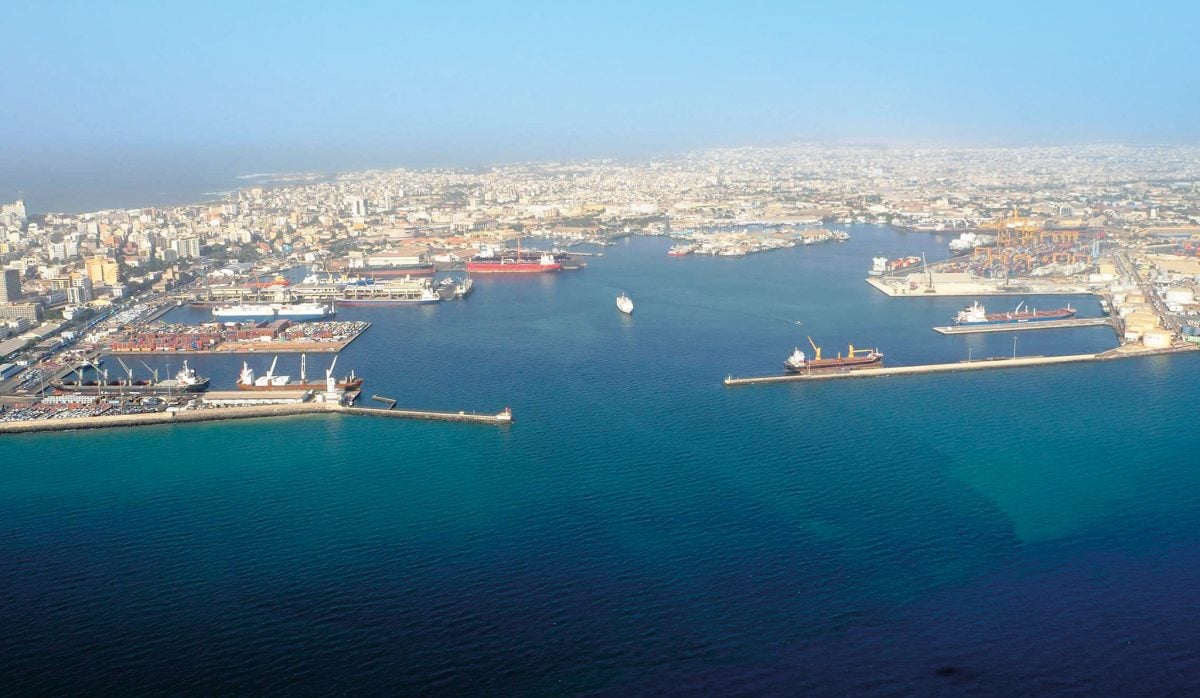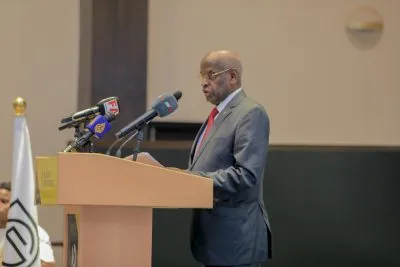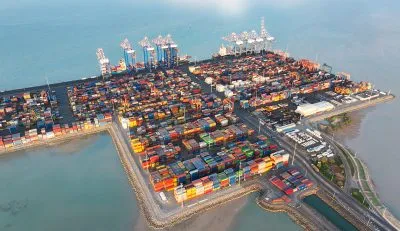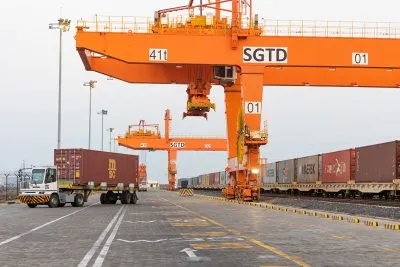In downtown Dakar, huge shipping vessels navigate the rocky peninsula of the capital city to dock in the West African country’s main port. Long queues of lorries stretch out from the Port Autonome de Dakar as logistics companies move the containers from the port to processing hubs, where the goods are sent onwards to their final destination in Senegal or further afield.
The port was initially built by the French in 1862, when Dakar was little more than a trading post used by European merchants with a military garrison to protect their trading interests. In 1960 the port was expanded and turned into the Port Autonome de Dakar under one of Senegal’s very first development agendas as an independent country.
The port is still a key cog in Senegal’s logistics sector – it processed around 22m tonnes of cargo in 2021 – but its position in the capital city puts a limit on capacity, which is at odds with the ambitions of policymakers in the West African country. In 2022, Dubai’s giant port operator, DP World, began construction of a $1.13bn deep-water port 50km south of Dakar. The project is DP World’s largest-ever investment in Africa and it should put Senegal on the map as a serious logistics player on the continent.
“The port will have a huge impact on Senegal’s logistics sector, enabling trade and driving growth over time,” says Richard Charlton, Head of Infrastructure Equity for Africa and Pakistan at British International Investment (BII), which is putting $300m into the new port. “We did some analysis when we were thinking about making the investment,” he recalls, “and found that by 2035 the port is forecast to enable the trade equivalent of 80% of GDP. As a result, 48% of the Senegalese population will benefit from it and it will support 2.3m jobs. And then we come onto the inland countries and we believe there is a significant part of Mali’s population that will benefit.”
Punching below its weight
At the moment, Senegal’s logistics capacity – broadly, the number of containers that can pass through the port each year – is currently well below that of other major terminals in Africa. The top ten ports in Africa are Tangier (Morocco), Durban (South Africa), Port Said (Egypt), Port Elizabeth (South Africa, Mombasa (Kenya), Casablanca (Morocco), Djibouti (Djibouti), Lomé (Togo), Abidjan (Côte d’Ivoire) and Tema (Ghana).
In 2021 Dakar’s cargo capacity, measured in standard containers, or twenty-foot equivalent units (TEU), was around 750,000 – compared to Tangier’s 7m. In West Africa, both Ghana and Côte d’Ivoire could handle around 1m TEU in 2020 – well above Senegal’s current capacity.
Mohamed Diop, regional director of Africa Atlantic for France’s logistics giant Bolloré, says that the arrival of the new port should herald a new dawn for Senegal’s logistics sector.
“We welcome the new port initiative because it will contribute to the modernisation of the sector and at the same time it will accelerate the transformation of ports and logistics,” he tells African Business.
“Practices at the Port Autonome de Dakar have become outdated: the new port will have more space, less congestion, more competitiveness and connectivity,” he says.
“Updating the logistics infrastructure is key to enabling and supporting the impressive growth that will likely happen as a result of the oil and gas projects. We, at Bolloré, will be here to support all partners in that growth.”
Diop believes that Bolloré will see a dramatic uptick in business with the arrival of the new port. The firm, which had its Africa arm acquired by the MSC Group in December, works with public and private clients in Senegal to help modernize and transform logistics operations.
He adds that other large infrastructure projects have also given rise to substantial growth in the sector. “Big projects like the oil and gas projects and also those associated with the Emerging Senegal Plan (PSE) have given rise to a logistics boom in the country.”
Opportunities and headwinds
To make the most of existing and planned ports, Senegal must capture trade from hinterland West African countries like Mali and Burkina Faso.If the country is able to position itself as the best port to process goods from within the region, it will be able to guarantee a heavy flow of traffic through its ports.
This means that it must stay competitive to compete with Abidjan, Accra and Lomé: three heavyweight ports that are accessible to Mali and Burkina Faso, a market of 50m people combined. However, the link with hinterland countries can also lead to a downturn in trade if instability disrupts the markets.
When the Economic Community of West African States (ECOWAS) imposed sanctions on Mali in January 2022 it cut off all exports through Senegal’s port of Dakar. This led to a huge downtown of trade at the port until sanctions were lifted more than six months later in July last year.
“It was a difficult period,” says Diop. “More than 70% of Mali’s exports go through Dakar and that was blocked. Many of our clients export cotton from Mali to the world via Senegal and therefore we had to find solutions to the shutdown in the normal route.”
Productivity depends on economy
Indeed, the growth of Senegal’s logistics sector will very much depend on the vitality of the local and regional economy. It stopped growing, for example, when the Covid-19 pandemic led to global closure of ports and logistics.
“What goes through the port, to some extent, depends on the development of the Senegalese economy,” says Charlton from BII. “But from our forecasts we think there should be good growth. And the new port has the capacity to match the expanding economy because it itself can be expanded in the years to come. You’re not hitting a brick wall of physical and geographic constraints like the old port.”
Read more about Senegal’s booming economy in our Senegal Dossier.
Want to continue reading? Subscribe today.
You've read all your free articles for this month! Subscribe now to enjoy full access to our content.
Digital Monthly
£8.00 / month
Receive full unlimited access to our articles, opinions, podcasts and more.
Digital Yearly
£70.00 / year
Our best value offer - save £26 and gain access to all of our digital content for an entire year!

 Sign in with Google
Sign in with Google 



